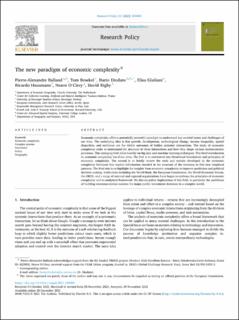| dc.contributor.author | Balland, Pierre-Alexandre | |
| dc.contributor.author | Broekel, Tom | |
| dc.contributor.author | Diodato, Dario | |
| dc.contributor.author | Giuliani, Elisa | |
| dc.contributor.author | Hausmann, Ricardo | |
| dc.contributor.author | O'Cleary, Neave | |
| dc.contributor.author | Rigby, David L | |
| dc.date.accessioned | 2023-03-09T10:11:26Z | |
| dc.date.available | 2023-03-09T10:11:26Z | |
| dc.date.created | 2021-12-23T10:35:46Z | |
| dc.date.issued | 2021 | |
| dc.identifier.citation | Balland, P. A., Broekel, T., Diodato, D., Giuliani, E., Hausmann, R., O'Clery, N., & Rigby, D. (2021). The new paradigm of economic complexity. Research Policy, 51(3), 104450. | en_US |
| dc.identifier.issn | 0048-7333 | |
| dc.identifier.uri | https://hdl.handle.net/11250/3057273 | |
| dc.description.abstract | Economic complexity offers a potentially powerful paradigm to understand key societal issues and challenges of our time. The underlying idea is that growth, development, technological change, income inequality, spatial disparities, and resilience are the visible outcomes of hidden systemic interactions. The study of economic complexity seeks to understand the structure of these interactions and how they shape various socioeconomic processes. This emerging field relies heavily on big data and machine learning techniques. This brief introduction to economic complexity has three aims. The first is to summarize key theoretical foundations and principles of economic complexity. The second is to briefly review the tools and metrics developed in the economic complexity literature that exploit information encoded in the structure of the economy to find new empirical patterns. The final aim is to highlight the insights from economic complexity to improve prediction and political decision-making. Institutions including the World Bank, the European Commission, the World Economic Forum, the OECD, and a range of national and regional organizations have begun to embrace the principles of economic complexity and its analytical framework. We discuss policy implications of this field, in particular the usefulness of building recommendation systems for major public investment decisions in a complex world. | en_US |
| dc.language.iso | eng | en_US |
| dc.publisher | Elsevier | en_US |
| dc.rights | Navngivelse 4.0 Internasjonal | * |
| dc.rights.uri | http://creativecommons.org/licenses/by/4.0/deed.no | * |
| dc.title | The new paradigm of economic complexity | en_US |
| dc.type | Peer reviewed | en_US |
| dc.type | Journal article | en_US |
| dc.description.version | publishedVersion | en_US |
| dc.rights.holder | The authors | en_US |
| dc.subject.nsi | VDP::Samfunnsvitenskap: 200 | en_US |
| dc.source.pagenumber | 11 | en_US |
| dc.source.volume | 51 | en_US |
| dc.source.journal | Research Policy | en_US |
| dc.identifier.doi | 10.1016/j.respol.2021.104450 | |
| dc.identifier.cristin | 1971666 | |
| cristin.ispublished | true | |
| cristin.fulltext | original | |
| cristin.qualitycode | 2 | |

